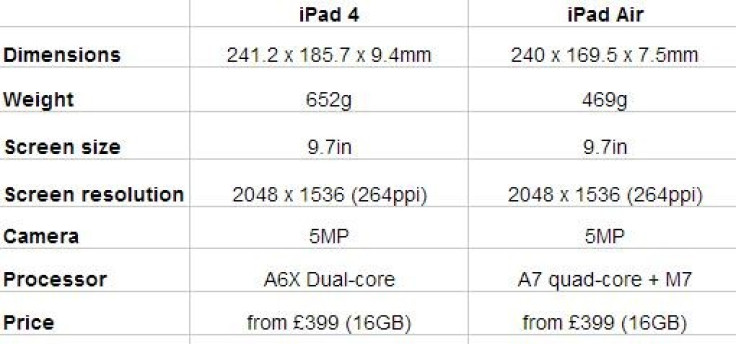iPad Air vs iPad 4: Should I Upgrade?
The new iPad Air has an improved design, faster processor and less weight, but should iPad 4 owners upgrade?

The iPad's update cycle has been inconsistent to say the least.
First we saw the jump from generation one to two in 2011, dramatically reducing both weight and thickness, then for 2012 the tablet grew slightly thicker and heavier to accommodate a Retina display. Just six months later Apple halved the tablet's annual update cycle to announce the fourth generation, complete with the new Lightning charging port and minor processor update.
And now we have the iPad Air, which is possibly the biggest update yet. Given the torrent of Android and Windows competition that simply didn't exist three years ago, Apple can no longer update however and whenever it feels like it - revolution needs to replace evolution in the California company's dictionary. Now the iPad Air has been unveiled, should owners of older models upgrade?

Hardware and Design
Until now, Apple's updates to the iPad have changed everything about from its footprint. Despite changes to back, display and internal, the screen bezel has remained identical since 2010 - and there's no getting away from the fact it was too big.
The iPad 5 shaves 16.1mm from the tablet's width, bringing its appearance closer to that of the iPad mini. Around the back, the fifth-generation tablet is squarer - again, like the mini - and the space grey (almost black) colour option is new. Unfortunately for some, the iPhone 5s's gold colour is not available on the iPad Air, as was previously speculated.
The iPad's display remains unchanged, but given its 2048 x 1536 'retina' resolution, we can let Apple off with holding onto it for another year. The competition may well be catching up, but it's still an excellent screen.
Rumour mills were convinced the new iPad would get the Touch ID fingerprint scanner introduced with the iPhone 5s last month, but Apple has held back, shunning the technology completely for the new iPad lineup and removing an incentive for iPad 4 owners to upgrade.
At 469g, the iPad Air is some 183g lighter than the iPad 4 - added to the thinner bezels this should make the Air easier to hold and use in one hand, something which couldn't be said for all previous models.
Performance
The new iPad gets the same 64-bit A7 processor as the iPhone 5s. Apple claims the new system-on-a-chip is five times faster than last year's A6, but battery life for the iPad Air remains the same as before at 10 hours.
Included in the A7 chip is Apple's new M7 co-processor, which measures the accelerometer, gyroscope and compass continuously to identify when you are walking, driving, stationery etc.
The M7 could be a big feature for Apple as it looks to cash in on the current trend for health and fitness apps - but while this makes sense on the pocketable iPhone, we're struggling to see how running apps will work on the iPad, given running with one would be nothing short of ridiculous. Over to the app developers on this one...
Software
The iPad 5 comes with iOS 7, the newest version of Apple's mobile operating system which first appeared on the new iPhone 5s and 5c last month. The company has made some major changes since last year's iOS 6, with a complete visual overhaul carried out by design chief Sir Jony Ive.
Our review of iOS 7 can be found here.
Having said that, iOS 7 is also available in full to owners of the iPad 3 and 4, so software-wise the iPad 4 and iPad Air remain identical.
Price
The iPad Air is priced exactly the same as the iPad 4, which mean a starting point of £399 for the 16GB model with Wi-Fi, rising to £639 for the 128GB model. Buyers wanting Wi-Fi and 3G / 4G connectivity will have to add an extra £100 to each price point.
To broaden the iPad range, Apple is keeping the iPad 2 on sale in its 16GB form for £329 - but remember, this model misses out on the higher-resolution Retina display.
Should I upgrade?
Difficult to answer at this stage. We were convinced Apple would bring its Touch ID fingerprint scanner to the iPad Air, along with the new gold colour option of the iPhone 5s.
Instead, the iPad Air's updates boil down to a lighter and thinner design, and a faster processor. While the design will be immediately appreciated - and will hopefully make the iPad more comfortable to hold in one hand - we won't get to see the upgraded processor really flex its muscles until developers create games intensive enough to strength it.
Owners of the iPad 1, 2 or 3 will certainly notice the difference when upgrading to the Air. But, as if often the case with Apple, owners of the most recent iteration are probably better off saving their money for another year.
But, also knowing, Apple - and it's adorning fans - there will no doubt be enormous queues and record sales when the iPad Air goes on sale on 1 November.
Read More:
© Copyright IBTimes 2024. All rights reserved.






